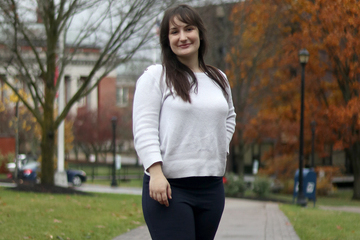
11/01/2019
SUNY Cortland psychology major Sonya Onyx has strived to improve the lives of the university’s non-traditional students as president of the Non-Traditional Student Organization (NTSO).
Balancing family life, childcare and full- or part-time jobs on top of coursework can be overwhelming for some non-traditional students.
But through sharing stories at NTSO meetings and the flexibility and support of faculty and staff across campus, non-traditional students are finding solutions that allow them to earn degrees and achieve their goals.
For Onyx, the hardest part is trying to find a mutual time that works for all of her non-traditional student friends.
“It’s tough to get adult students all together,” she said. “Not only do we have to coordinate our class schedules, but also our work schedules and our school drop-off schedules. This year we have a really great group of cabinet members who are really dedicated to the club. Our goal is to make non-traditional student lives easier and more enjoyable at school."
Onyx was raised in the Saratoga Springs, N.Y. area and ultimately moved to Washington state, where she worked as a civilian employee in intelligence and communications for the U.S. Navy before transitioning to teaching preschool. She returned to New York and studied briefly at SUNY Adirondack before deciding to come to Cortland and pursue a bachelor’s degree in psychology.
She hopes to continue her studies after she graduates in May and teach elementary-age students.
Working with youngsters gave Onyx a sense of satisfaction and fulfillment she lacked while working for the Navy.
“Teaching elementary schools is a little bit of everything,” she said. “There is some art and physical education, too. I feel like that’s where my talents and my purpose align.
“Working for the Navy, I was making good money, but it didn’t give me a great amount of purpose. There were missions I was working on where I didn’t even know what I was doing because I didn’t have the clearance to do that. ‘OK captain, here’s what you asked for.’ What’s it for? You can’t tell your family that you’re working on a big thing.”
Onyx is tremendously grateful to the Cortland faculty members who have lent an understanding ear to her personal scheduling conflicts. She cares for daughters Rosa, 5, and Emmaline, 3, and has previously balanced working multiple part-time jobs as well.
So when a babysitter bails at the last minute, Onyx is confident that she can work things out with professors to ensure she makes up the coursework even if she’s forced to miss a class.
“They’re pretty understanding about my time being dictated not just by me,” she said. “I’ve had a couple of instances where I had to be late or miss class and they’ve been supportive of that.”
That type of relationship has worked in both directions for Onyx and the faculty members she’s come to know. A recent encounter with Patricia Roiger, a lecturer in the Childhood/Early Childhood Education Department, made that point clear.
“I just ran into one of my former professors, Professor Roiger,” Onyx said. “She’s an angel. I just love her. I had her last year and she remembered my daughter’s ages and their names and she was just so sweet.”
And that’s exactly the type of community she’s thankful Cortland has built for its non-traditional students.
SUNY Cortland has some 300 non-traditional students enrolled.
The College defines its non-traditional undergraduate students as those who are at least 24 years old or have had an interruption or delay in their education since high school. They also might have dependent children, regardless of their ages.
The College celebrated them all Oct. 28 to Nov. 1 with Non-Traditional Students Week. In addition to an array of activities offered through Advisement and Transition, one inspiring non-traditional student was introduced daily to the SUNY Cortland community.
For more information about Non-Traditional Students Week events or to recognize an outstanding non-traditional student, contact Non-Traditional Student Support Coordinator Cheryl Hines at 607-753-4726.